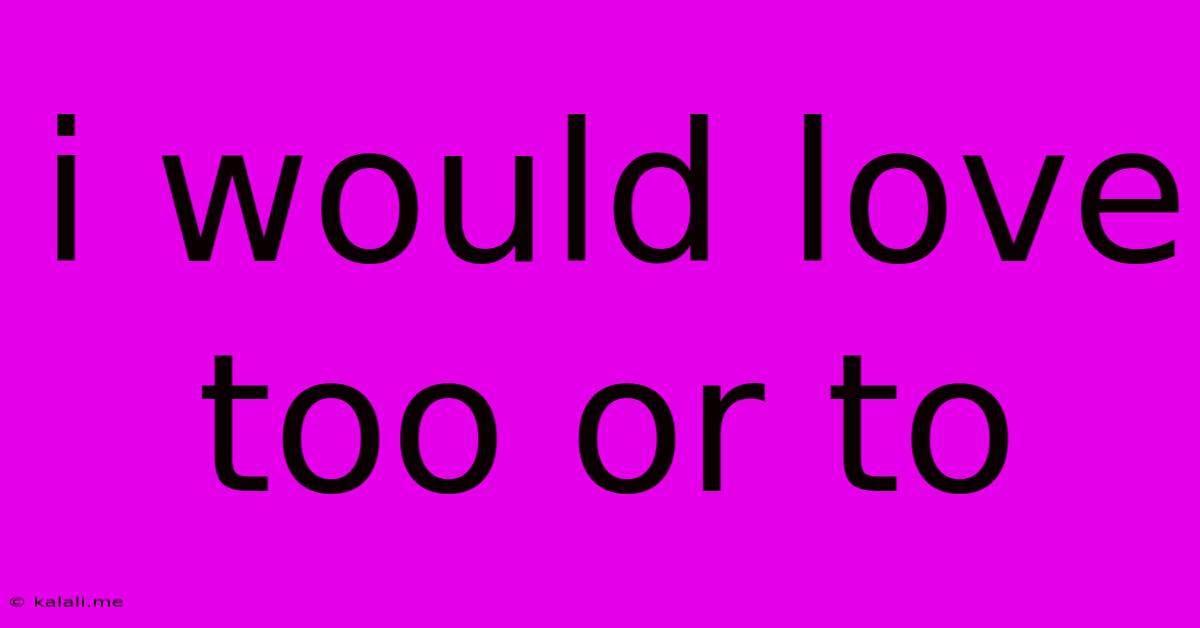I Would Love Too Or To
Kalali
May 25, 2025 · 3 min read

Table of Contents
I Would Love To vs. I Would Love Too: A Grammatical Deep Dive
Choosing between "to" and "too" can be surprisingly tricky, even for native English speakers. This seemingly small difference can significantly alter the meaning of your sentence. This article will clarify the usage of "I would love to" versus "I would love too," helping you confidently select the correct option in your writing and speech. Understanding this nuance will improve your grammar and boost the clarity of your communication.
Understanding the Difference: "To" vs. "Too"
The core issue lies in the distinct functions of "to" and "too." "To" is an infinitive marker, indicating the intended action following a verb. "Too", on the other hand, is an adverb that means "also" or "excessively."
- "To": Indicates purpose or direction. Example: "I went to the store." It shows the purpose (going to the store).
- "Too": Adds extra information or indicates excess. Example: "I went to the store too." It shows that the speaker went to the store as well. Alternatively: "The coffee is too hot." This indicates an excess of heat.
"I Would Love To": Expressing Willingness
The phrase "I would love to" expresses a polite and enthusiastic acceptance of an invitation or proposition. The "to" acts as the infinitive marker, completing the verb "love." This phrase conveys a desire to participate in the suggested activity.
Examples:
- "Would you like to come to the party?" "I would love to!"
- "Would you be willing to help with the project?" "I would love to, if I have the time."
- "Shall we go for a walk?" "I would love to. It's a beautiful day."
This construction is versatile and can be used in various formal and informal settings. It’s a simple yet effective way to convey eagerness and politeness.
"I Would Love Too": Incorrect Usage
Using "too" in this context is grammatically incorrect. It would imply that the speaker is also loving something, which doesn't make logical sense within the typical context of the phrase. It's a common error, stemming from the similar spellings and sounds of "to" and "too."
Avoiding Common Mistakes and Improving Clarity
Remember the key difference:
- "To" is for expressing intent or purpose following a verb.
- "Too" means "also" or "excessively."
Using the incorrect word changes the entire meaning and makes your writing or speech sound unnatural. Always double-check your use of "to" and "too" to maintain grammatical accuracy. Proofreading and using a grammar checker can significantly reduce such errors. Focusing on the context will help you determine which word is grammatically correct and conveys the intended meaning accurately.
Conclusion: Choosing the Right Word
Mastering the difference between "to" and "too" is crucial for clear and grammatically correct communication. Using "I would love to" correctly demonstrates a strong grasp of English grammar and enhances your overall writing and speaking proficiency. By understanding this simple yet significant grammatical distinction, you'll significantly improve your communication skills. So, remember to choose "to" when expressing willingness and "too" only when indicating addition or excess.
Latest Posts
Latest Posts
-
How To Get Rid Of Mildew In Shower
May 26, 2025
-
What Will Happen If The Sun Explodes
May 26, 2025
-
Dnd Background Feature Can Find Anything
May 26, 2025
-
Drupal 10 Honeypot Not Adding Element
May 26, 2025
-
Best Fish For Fish Pond Stardew
May 26, 2025
Related Post
Thank you for visiting our website which covers about I Would Love Too Or To . We hope the information provided has been useful to you. Feel free to contact us if you have any questions or need further assistance. See you next time and don't miss to bookmark.